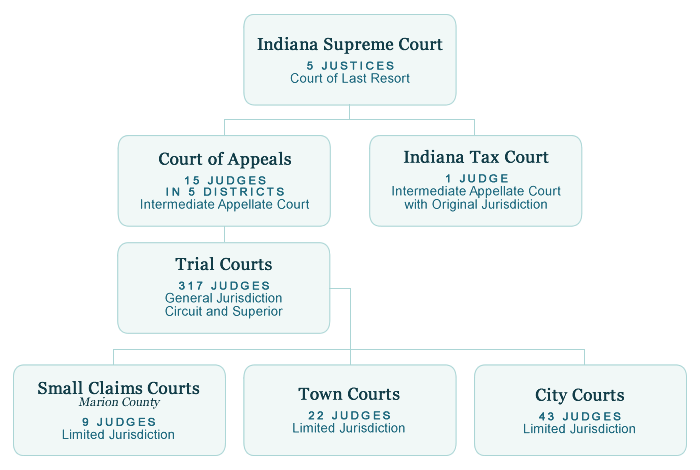A breakdown of which Indiana courts may be involved in your personal injury case
When a person is injured and files a lawsuit against the person at fault seeking damages, the lawsuit is called a personal injury lawsuit.
In Indiana, there are 3 main court systems where a person might file a personal injury lawsuit:
- Small claim courts
- State-level trial courts (circuit and superior courts)
- Federal courts
Source: Indiana Judicial Branch
Most personal injury cases will be filed in the circuit or superior court located in the town where the accident occurred or the defendant lives. But let’s take a look at all of the possibilities.
Small claims courts
Indiana’s small claims courts only handle matters in which the damages claimed don’t exceed $6,000 (except in Marion County where the damages limit is $8,000).
Small claims courts are relatively informal. The Indiana Rules of Evidence don’t apply, nor do the Indiana Rules of Procedure. You’ll simply fill out a form explaining your issue and both sides will have an opportunity to argue their case in front of a judge.
Marion County is the only county in Indiana with separate small claims courts (1 in each of its 9 townships). In all other counties, the circuit court hears small claims or a division of the superior court hears small claims.
What are city and town courts?
City and town courts can be created by local ordinance. Currently, there are 47 city courts and 28 town courts in Indiana.
You’re not likely to file a personal injury lawsuit in either of these courts, as they primarily handle traffic matters and ordinance violations.
City and town courts aren’t courts of record. As a consequence, appeals go to the circuit or superior court in the county and are decided as if they were never in court before.
Interestingly, city and town court judges aren’t required to be attorneys and they are elected by voters of the city or town.
State-level trial courts
Trial courts are courts of “general jurisdiction,” which means they have the power to hear any civil (or criminal) case, including:
- Tort cases
- Contract cases
- Property rights cases
- Criminal cases
- Divorce cases
In Indiana, there are 2 different kinds of trial courts:
- Circuit courts. Every county in Indiana has at least one circuit court.
- Superior courts. Most counties in Indiana have a superior court in addition to a circuit court.
Though the courts have different names, this is primarily due to legislative inconsistencies. In reality, there is no significant difference between circuit courts and superior courts.
The vast majority of personal injury lawsuits in Indiana are filed in a circuit or superior court.
Unlike small claims courts, these courts have strict local rules, rules of evidence, and rules of procedure that must be followed. As a result, filing a lawsuit in a circuit or superior court without an attorney, though allowed, is challenging and risky.
Indiana Supreme Court
The Indiana Supreme Court is the state’s highest court. In all likelihood, your personal injury case will not be heard by the Supreme Court. Indiana’s Supreme Court only hears 2 types of cases:
- Appeals. The Indiana Supreme Court hears cases that are appealed from lower courts (circuit and district courts).
- Original jurisdiction. The Indiana Supreme Court hears certain cases involving very specific situations, including habeas corpus writs (requests for the court to sign an order demanding that a public official deliver an imprisoned individual to the court and show a valid reason for that person’s detention).
Federal courts
In Indiana, there are 2 federal courts that you need to know about:
- The United States District Court of the Northern District of Indiana
- The United States District Court of the Southern District of Indiana
Federal courts are courts of “limited jurisdiction” because they can ONLY hear the following types of cases:
- Cases that involve a violation of the U.S. Constitution or federal law
- Cases in which there is complete diversity
Chances are your personal injury lawsuit doesn’t involve the U.S. Constitution or a federal law (though it’s certainly possible). It’s more likely that your case has “complete diversity.”
Complete diversity exists when:
- The plaintiff lives in a different state than the defendant, and
- The case in controversy (the total amount of damages claimed) is more than $75,000.
Just because your case can be filed in federal court, doesn’t mean it must. You can choose instead to file in state court, though the opposing party might try to “remove” your case to federal court.
Choosing a venue for your personal injury case
Once you’ve figured out the appropriate court system, you’ll need to decide the proper venue. The term “venue” refers to the geographic location of the court.
In other words, you may decide you need to file your case in circuit court, but the circuit court of which county?
In most personal injury lawsuits, you can file your lawsuit:
- In the county where the defendant lives, or
- In the county where the accident occurred.
Let’s say you’re involved in a car accident in Noble County with a driver who ran a red light. You live in Marion County and the defendant lives in Elkhart County. You’re injured in the accident and are claiming damages in the amount of $20,000.
In the above scenario, you could either file your lawsuit in the Elkhart County Circuit Court (where the defendant lives) or the Noble County Circuit Court (where the accident occurred). You can’t file your lawsuit in federal court because you don’t have complete diversity and no federal laws were violated, nor can you file your lawsuit in small claims court because the amount of damages exceeds $6,000.
Unfortunately, a plaintiff can’t file a lawsuit where they live in most cases, unless the accident occurred there or the defendant also lives there. This is because the Indiana venue rules (and the venue rules of all states) are concerned with making sure the defendant doesn't get dragged across the country by the plaintiff.
Learn more about where a case can be heard when an accident involves parties from multiple states.
Statute of limitations for civil cases in Indiana
Remember, the deadline for filing most personal injury lawsuits in Indiana is 2 years. If you don’t file and serve the defendant within 2 years of the accident, you won’t recover any damages.
To make sure you file timely and in the right court, consider contacting an Indiana personal injury attorney using the free Enjuris legal directory.
See our guide Choosing a personal injury attorney.



